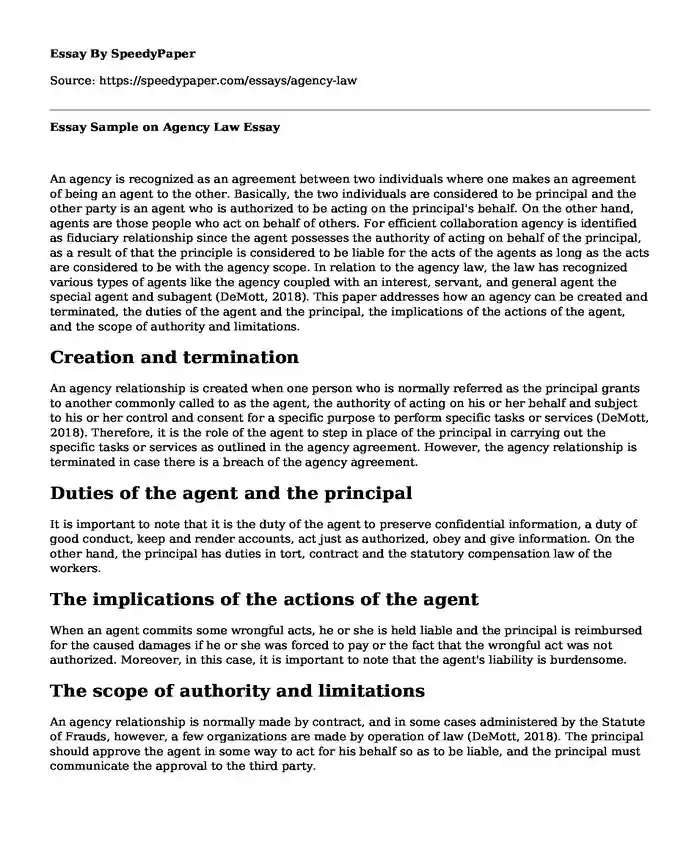
| Type of paper: | Essay |
| Categories: | Business law Employment law |
| Pages: | 3 |
| Wordcount: | 552 words |
An agency is recognized as an agreement between two individuals where one makes an agreement of being an agent to the other. Basically, the two individuals are considered to be principal and the other party is an agent who is authorized to be acting on the principal's behalf. On the other hand, agents are those people who act on behalf of others. For efficient collaboration agency is identified as fiduciary relationship since the agent possesses the authority of acting on behalf of the principal, as a result of that the principle is considered to be liable for the acts of the agents as long as the acts are considered to be with the agency scope. In relation to the agency law, the law has recognized various types of agents like the agency coupled with an interest, servant, and general agent the special agent and subagent (DeMott, 2018). This paper addresses how an agency can be created and terminated, the duties of the agent and the principal, the implications of the actions of the agent, and the scope of authority and limitations.
Creation and termination
An agency relationship is created when one person who is normally referred as the principal grants to another commonly called to as the agent, the authority of acting on his or her behalf and subject to his or her control and consent for a specific purpose to perform specific tasks or services (DeMott, 2018). Therefore, it is the role of the agent to step in place of the principal in carrying out the specific tasks or services as outlined in the agency agreement. However, the agency relationship is terminated in case there is a breach of the agency agreement.
Duties of the agent and the principal
It is important to note that it is the duty of the agent to preserve confidential information, a duty of good conduct, keep and render accounts, act just as authorized, obey and give information. On the other hand, the principal has duties in tort, contract and the statutory compensation law of the workers.
The implications of the actions of the agent
When an agent commits some wrongful acts, he or she is held liable and the principal is reimbursed for the caused damages if he or she was forced to pay or the fact that the wrongful act was not authorized. Moreover, in this case, it is important to note that the agent's liability is burdensome.
The scope of authority and limitations
An agency relationship is normally made by contract, and in some cases administered by the Statute of Frauds, however, a few organizations are made by operation of law (DeMott, 2018). The principal should approve the agent in some way to act for his behalf so as to be liable, and the principal must communicate the approval to the third party.
Why important
Agency relationships are very important as they create obligations and potential liabilities for agents and principals, as well as remedies for breach of an agency agreement.
Conclusively, agency relations are vital in the day to day business activities. Moreover, a contract legally binds the principal even when it has been made by the agent on the principal's behalf. Lastly, successful and effective agency relations are governed by law or the agency agreement.
References
DeMott, D. (2018). Fiduciary Principles in Agency Law.
Cite this page
Essay Sample on Agency Law. (2022, Nov 30). Retrieved from https://speedypaper.com/essays/agency-law
Request Removal
If you are the original author of this essay and no longer wish to have it published on the SpeedyPaper website, please click below to request its removal:
- Free Essay on the Theme of Effective Social Work
- Free Essay with the Case Study of International Organization Media Company
- Essay Sample about Cultural Diversity in the Health Sector
- Free Essay Sample Comprising a Care Plan for Lisa
- Free Essay: The Path to Successful Change at a Manufacturing Company
- Essay Example on Biography of Antonio de Cabezon
- Essay Sample on Health Insurance and Quality
Popular categories




